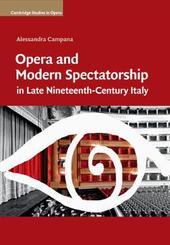
|
Opera and Modern Spectatorship in Late Nineteenth-Century Italy
Paperback / softback
Main Details
| Title |
Opera and Modern Spectatorship in Late Nineteenth-Century Italy
|
| Authors and Contributors |
By (author) Alessandra Campana
|
| Series | Cambridge Studies in Opera |
|---|
| Physical Properties |
| Format:Paperback / softback | | Pages:222 | | Dimensions(mm): Height 243,Width 170 |
|
| Category/Genre | Romantic music (c 1830 to c 1900)
Opera |
|---|
| ISBN/Barcode |
9781107666641
|
| Classifications | Dewey:782.1094509034 |
|---|
| Audience | | Professional & Vocational | |
|---|
| Illustrations |
29 Printed music items; 22 Halftones, unspecified; 24 Halftones, black and white; 2 Line drawings, black and white
|
|
Publishing Details |
| Publisher |
Cambridge University Press
|
| Imprint |
Cambridge University Press
|
| Publication Date |
8 February 2018 |
| Publication Country |
United Kingdom
|
Description
At the turn of the twentieth century Italian opera participated to the making of a modern spectator. The Ricordi stage manuals testify to the need to harness the effects of operatic performance, activating opera's capacity to cultivate a public. This book considers how four operas and one film deal with their public: one that in Boito's Mefistofele is entertained by special effects, or that in Verdi's Simon Boccanegra is called upon as a political body to confront the specters of history. Also a public that in Verdi's Otello is subjected to the manipulation of contemporary acting, or one that in Puccini's Manon Lescaut is urged to question the mechanism of spectatorship. Lastly, the silent film Rapsodia satanica, thanks to the craft and prestige of Pietro Mascagni's score, attempts to transform the new industrial medium into art, addressing its public's search for a bourgeois pan-European cultural identity, right at the outset of the First World War.
Author Biography
Alessandra Campana is Assistant Professor of Music at Tufts University, Massachusetts. She studied at the University of Rome 'La Sapienza', University of York and Cornell University, New York, and was a Junior Research Fellow at New College, University of Oxford. Besides her work in opera studies, her research spans more broadly the interfaces of sound and vision in theatre, film and video. Co-chair of the Opera Seminar at the Mahindra Humanities Centre at Harvard University, Massachusetts, she is an Associate Editor of The Opera Quarterly.
|